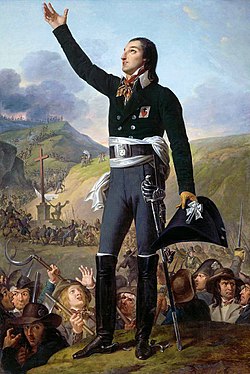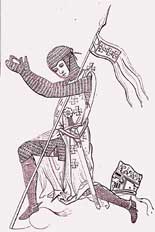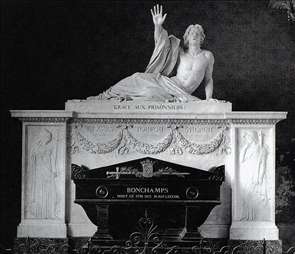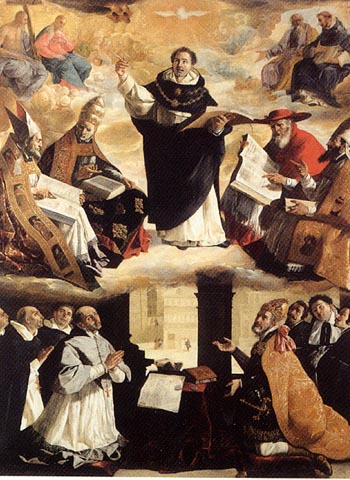 Here is a portrait of Charles Melchior Artus, the Marquess of Bonchamps, one of the gentlemen who led the uprising against the French Revolution in the name of the King of France.
Here is a portrait of Charles Melchior Artus, the Marquess of Bonchamps, one of the gentlemen who led the uprising against the French Revolution in the name of the King of France.He exemplified everything that was, and is, best in the Christian nobility of the old Catholic Kingdom of France.
The egalitarian modern world doesn't seem to have much use for gentility, still less Christian gentility.
Then, again, neither does it have much use for the ideas that engender Christian nobility and chivalry.
Jack's as good as his master and both of them are out to get what they can and the Devil take the hindmost.
That is the dog-eat-dog creed of the modern egalitarian world.
And what has it done for us?
It has ensured that the standards in society - at all levels - have taken a massive nose-dive into a slough of despond. Now the lowest common denominator rules and the worthless creed of Messrs Sell More, Swindle and Bolt is in the ascendancy.
Is that virtue? Is that the route to happiness? Has it made us happier?
Well, let's be frank. No.
When society recognized that the different classes were interdependent and mutually supporting, then charity and self-sacrifice were highly prized. A genuine equality of humanity was thereby encouraged rather than the spurious equality of egalitarianism which is no more than the grasping spirit of social Darwinism, the survival of the meanest and nastiest, and to hell with the weak and vulnerable. Some equality, that is!
But part of the problem is the failure by many to understand the relationship between the classes in society at its best. Successive generations of revolutionary writers and historians have so poured scorn on the values of former times that now no-one can remember what they even were, let alone understand or approve them.
The truth is that the proper relationship between the classes was one of mutual respect, understanding, obligation and charity.
This was because it had been shaped and formed by Christianity and the darkness of paganism had been set aside by the newer religion.
As it is written in Scripture:
"25 But Jesus called them to him, and said: You know that the princes of the Gentiles lord it over them; and they that are the greater, exercise power upon them.
26 It shall not be so among you: but whosoever will be the greater among you, let him be your minister: 27 And he that will be first among you, shall be your servant. 28 Even as the Son of man is not come to be ministered unto, but to minister, and to give his life a redemption for many".
[Matt 20:25-28]
"42 But Jesus calling them, saith to them: You know that they who seem to rule over the Gentiles, lord it over them: and their princes have power over them. 43 But it is not so among you: but whosoever will be greater, shall be your minister. 44 And whosoever will be first among you, shall be the servant of all. 45 For the Son of man also is not come to be ministered unto, but to minister, and to give his life a redemption for many".
[Mark 10:42-45]
"24 And there was also a strife amongst them, which of them should seem to be the greater. 25 And he said to them: The kings of the Gentiles lord it over them; and they that have power over them, are called beneficent.
26 But you not so: but he that is the greater among you, let him become as the younger; and he that is the leader, as he that serveth. 27 For which is greater, he that sitteth at table, or he that serveth? Is it not he that sitteth at table? But I am in the midst of you, as he that serveth".
[Luke 22:26-27]
In the Christian dispensation, the necessity of hierarchy was recognised but the master and the servant were both the servant of each other since, in the kingdom of heaven, the last was to be first and the first, last.
In the modern egalitarian world, hierarchy, being natural to man, still exists but it is not recognized and no man is willing to be the servant of another but only of himself. That is the best definition of Hell imaginable. No-one and nothing is superior, not the law, not the king, not morality and not even God. No man can appeal to a higher authority against the depredations of his neighbour. The rule of the majority is the end of all morality and might is right.
Kings and gentlemen are abolished but not only them. So, too, is the sturdy peasant and the working man.
All that is left is the amorphous, conscienceless, aimless, masses with no identity, no origin, no goal, no ideals and nothing to give but only to take.
And a bizarre, mocking caricature of the Christian gentlemen becomes the fashionable butt of every uncultured and semi-literate ignoramus of the age.
The true likeness of the Christian gentleman is forgotten.
 Louis, Marquess of Lescure, another Vendean General, was worshipped by his troops who called him "the Saint of Poitou" for his virtue, his courage and his sanctity. He was killed by the revolutionaries in the Vendean war.
Louis, Marquess of Lescure, another Vendean General, was worshipped by his troops who called him "the Saint of Poitou" for his virtue, his courage and his sanctity. He was killed by the revolutionaries in the Vendean war.The true Christian gentleman is first and foremost a Christian. He lives by the code of chivalry:
He defends the Church; he defends and extends the bound of Christendom; he respects all weaknesses, and constitutes himself the defender of them, as he would of our Lord Himself; he defends the honour, name and virtue of all women and treats them with the greatest courtesy and forbearance as he would our Lady herself; he opposes those who oppose truth and justice and who oppress the poor and weak; he does not bear false witness and remains faithful to his pledged word; he is generous to all, and he is everywhere and always the champion of the Right and the Good against Injustice and Evil.
Of such is the "reactionary feudalism" so much hated by modern egalitarians who do not want to be bound by duty or honour but want to be "free" - but their freedom is only to exploit, cheat, lie and steal.
Historically, the reason why the Christian nobility were often in pursuit of the fox or the stag was because that way they learned the necessary arts which were preparatory for war, since it was their role, above all others, to be prepared to sacrifice themselves for the defence of Christendom in war.
 The "unspeakable after the uneatable" or the Christian nobility keeping themselves in readiness for war to defend others?
The "unspeakable after the uneatable" or the Christian nobility keeping themselves in readiness for war to defend others?That, too, is why they were permitted to bear arms and why they wore the noble "culotte" or knee-breeches. This enabled them to don the riding boot and be ready for war at short notice.
The sacrifice of the Christian leadership did not end there. They were also obliged to take on offices of state in their spare time and to ensure that all those under their care and responsibility, from the greatest to the least, were provided for and treated with justice and humanity.
That, too, is why they were permitted the ownership of estates and wealth - not so that they could give themselves up to selfish and self-indulgent pursuits like the billionaires of our grasping, egalitarian age, but so that they could use their wealth and bounty to serve those in need and to enable themselves to have sufficient leisure to be able to serve others whether privately or in public office.
 The Knights Hospitaller of St John of Jerusalem drew from the ranks of the Christian nobility and epitomised the spirit of nobility by combining both the vocation of war with that of hospital service to "Our Lords" the sick-poor and, furthermore, took the 3 vows of religion in so doing
The Knights Hospitaller of St John of Jerusalem drew from the ranks of the Christian nobility and epitomised the spirit of nobility by combining both the vocation of war with that of hospital service to "Our Lords" the sick-poor and, furthermore, took the 3 vows of religion in so doingPublic office in that understanding was regarded as a sacred trust to be exercised for the benefit of others and particularly the weak and vulnerable.
It was not like today when it is seen as a means of feathering one's own nest at public expense when public figures do not hesitate to use public funds to clean their moats and buy themselves bird houses and cheap mortgages.
Of course not all gentlemen in times past behaved as they should but then they were universally condemned as "cads", "bounders", "mountebanks" and so on.
Now they would be lauded as "clever", "astute", "shrewd" and "business-like" when, in reality, they should be regarded as cheats, liars and traitors.
That is why the gentleman preferred amateur status rather than professional status in matters sporting. Games were for healthy, competitive fun and not for turning over to a den of thieves bent only upon filthy lucre which is what games like football have now become.
The Christian gentleman should emulate the "verray parfit gentil knight" of Chaucer's Canterbury Tales and be men of honour, self-sacrifice and duty, scornful of moral weakness and self-indulgence and constantly aware of their duty to lead and to serve, to succour the weak and poor and to defend truth and justice.
The Christian nobility should witness to the true nobility and genius of Christianity. Antiquity of name, arms and family should not merely be an end in itself but should ever be an encouragement to greater and better deeds of charity, courage, heroism and self-sacrifice. The nobler the name, the nobler should be the deed and Christian gentlemen should vie with one another to outdo each other in virtue.
Few have reached the heights of nobility and self-sacrifice of Charles de Bonchamps, the noble Commander-in-Chief of the Royal and Catholic Grand Army of the Vendee. Beloved of his peasants, he led them, at their insistence, against the foul, murderous, egalitarian French Revolutionary regime.
When he lay mortally wounded and filled with horror at a plan of some of his men to set fire to a building filled with revolutionary soldiers who had murdered women and children, he commanded that they be spared.
He called to his officers to see that they were all saved, demanding that they prevent any such acts of murder: "It would be a horror. I forbid it. This is my last command! See that it is obeyed!".
And then the great and noble leader of the Vendeans himself died the noble death of a soldier who has done his duty.
One of the revolutionary soldiers spared was the father of the sculptor, Pierre Jean David, who, though an enemy of Bonchamps, later, in gratitude, carved a famous monument to the Vendean General, with the inscription:
"Mercy to the prisoners! Bonchamps orders it!"
A more noble epitaph could hardly be imagined.
...

























.jpg)


























_-002.jpg/220px-Circle_of_Anton_Raphael_Mengs,_Henry_Benedict_Maria_Clement_Stuart,_Cardinal_York_(ca_1750)_-002.jpg)


